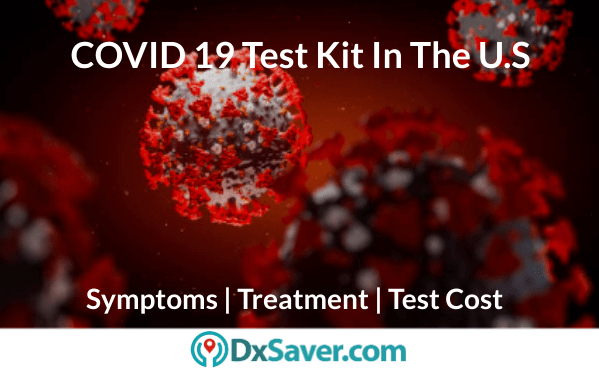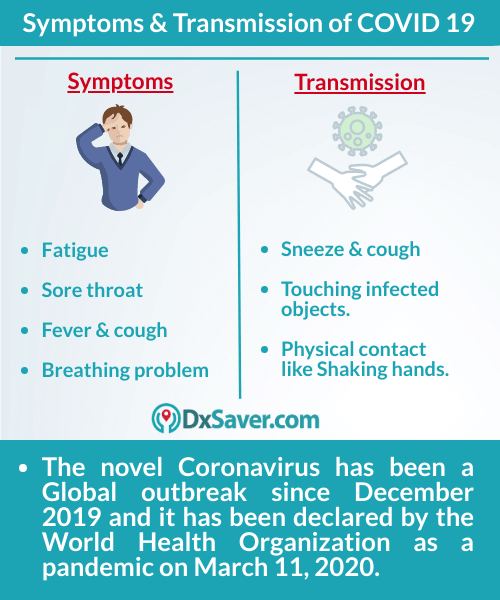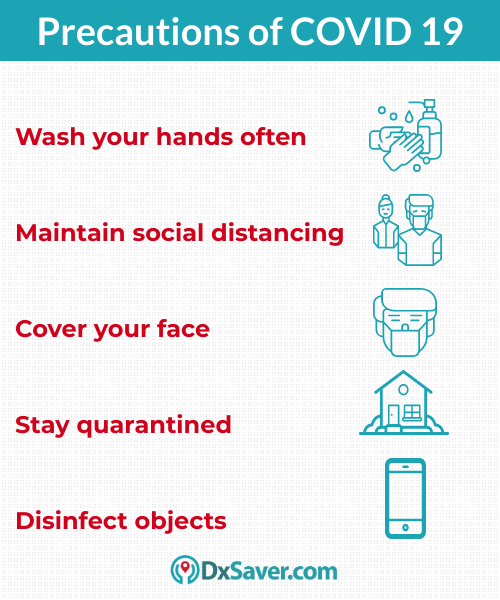
A new virus in early 2020 started accelerating headlines all over the world because of its rapid speed of transmission. The virus was first traced in December 2019 from a food market in Wuhan, China. From there, it started transmitting to the other countries as distant as the United States. Keep reading to know more about the COVID 19 test kit cost. The virus was officially named SARS-CoV-2, has been responsible for infecting millions of individuals globally and also causing hundreds of thousands of deaths every day. According to WHO, the most affected country is the United States.
COVID-19, the disease caused by an infection SARS-CoV-2, which stands for the coronavirus disease in December 2019. In spite of the global pandemic, in the news about this virus, you will not be infected with coronavirus unless you’ve been in contact with someone who has a coronavirus infection.
The article below covers all the important topics that are related to Coronavirus, testing of Coronavirus at home and at the lab, its cost, what are the symptoms of the Coronavirus, how have they transmitted person to person, where to test for Coronavirus, causes, risk factors, what are its complication, their treatment, and precautions to be undertaken to protect from the virus.
- What is Coronavirus?
- At home COVID 19 test kit in the U.S
- How to get tested for COVID 19?
- What are its types?
- Causes of COVID 19
- What are the symptoms of Coronavirus?
- How is COVID 19 transmitted?
- What are the complications?
- Is coronavirus curable?
- Coronavirus Vaccine
- What are the treatments for COVID 19?
- Precautions to be taken
- Provider’s Location
What is Coronavirus?
The novel Coronavirus has been a Global outbreak since December 2019 and it has been declared by the World Health Organization as a pandemic on March 11, 2020. It is a new illness that can affect your lungs and respiratory tracks and it is also said the virus is mostly transmitted among people through making human contact like shaking hands and touching the eyes, mouth or other parts of your body and by breathing the air where someone with a virus has sneezed or coughed, and are exposed to objects or surfaces.
Get your COVID-19 test kit:
At home COVID 19 test kit in the U.S
The test cost of Coronavirus varies in different labs and testing centers across the United States. As there are a limited number of labs and facilities available as compared to the individual getting speedily affected due to the virus, there is an option where you can avail at-Home test for COVID-19. The Food and Drug Administration (FDA) on April 21, 2020, approved the use of the first COVID-19 home test kit. Now people will be able to collect a nasal sample using a cotton swab and mail it to a laboratory for testing purposes.
According to the emergency-use authorization, the test kit is authorized for those who have a prescription from the physician stating to have identified COVID-19 symptoms.
How to get tested for COVID-19?
Reverse transcription-polymerase chain reaction(RT-PCR) also known as a reverse-PCR test is the most commonly used method for testing coronavirus by many countries including the United States. In this process, the testing can be done on respiratory samples by using various methods like nasopharyngeal swab where the physicians collect the sample from the back of the nose or throat by using a narrow stick made of a short plastic rod, and at end tip, with an adsorbing material like cotton. Otherwise, the affected person’s sputum samples or blood samples can also be provided to the physicians in the specimen tube and the samples will be sent to the lab and the results are generally available within 48 hours. You can also buy COVID 19 test kit.
What are its types?
The word corona means “crown” and that’s why coronavirus gets its name from the way it looks under a microscope. This round virus has a crown-shaped protein which is called peplomers jutting out from its center in every direction as these proteins help the virus whether it can infect its host or not. The condition known as a severe acute respiratory syndrome otherwise called SARS was also linked to a highly infectious coronavirus in the early 2000s and this SARS virus has since been successfully contained.
COVID-19 vs. SARS
The 2003 SARS outbreak was also caused by a coronavirus as it was first found in animals before it was transmitted to human beings. The SARS virus was originated from bats and was transferred to other animals and then to human beings. After it was caught by a human, the SARS virus began spreading quickly among other people. But what makes the new coronavirus so newsworthy is that treatment hasn’t been developed to prevent its rapid spread from person to person.
Causes of COVID 19
Coronaviruses are zoonotic which means they were first developed in animals before being transmitted to humans and once the virus develops in humans, coronaviruses can be transmitted from one person to another person through respiratory droplets. The virus hangs out in these droplets and then can be breathed into the respiratory windpipe and lungs, where the virus then leads to an infection. Researchers say that the virus may have been passed from bats to other animals like snakes or pangolins and then it must have transmitted to humans.
What are the symptoms of coronavirus?
The symptoms of Coronavirus infection do not show at an early stage up to 14 days. If in any case, you have traveled to a country in the past 14 days or live in an area where the ongoing spread of the disease is prevalent or if you have been exposed to another person who has coronavirus, we highly recommend you to take a test at a nearby Laboratory or order for At home COVID 19 test kit. The following are the symptoms that indicate whether you are affected by the Coronavirus:
- Cough
- Fever
- Shortness of breath/shortness of breath
- Fatigue
Less common symptoms include:
- Chills
- Repeated shaking with chills
- Sore throat
- Headache
- Muscle aches and pains
- Loss of taste
- Loss of smell
If you experience any other symptoms like persistent pain in the chest or bluish lips or face, then you must reach out to your nearby Lab or testing center to get tested. The Centers for Disease Control and Prevention (CDC) is investigating the full list of COVID-19 symptoms.

How is COVID-19 transmitted?
Coronavirus is transmitted by the respiratory droplets coming out from an infected person when a healthy person is in proximity lesser than 6 meters come in contact can get affected. Thus the virus is transmitted by:
- Cough
- Sneeze
- Touching the places where the infected person has come in contact.
- Physical contact with the affected like shaking hands.
Unlike smallpox and other air-borne diseases, the new Coronavirus is not transmitted through air and scientists are still learning about the other ways how the virus transmits from one person to another.
What are the complications?
The serious complication of COVID-19 is this pneumonia which’s called NCIP or 2019 novel coronavirus-infected pneumonia. Around 138 people were admitted into hospitals in Wuhan, with NCIP finding that 26 percent of those admitted had severe cases and needed to be treated in ICU. Out of which, 4.3 percent of the people who were in ICU died from this type of pneumonia.
The infected who were admitted to the ICU were on average older and had other underlying health conditions than people who didn’t go to the ICU. The studies say that NCIP is the only complication linked to the 2019 coronavirus. The following complications in people who have developed COVID-19 are:
- Acute respiratory distress syndrome (ARDS)
- Irregular heart rate (arrhythmia)
- Cardiovascular shock
- Severe muscle pain (myalgia)
- Fatigue
- Heart damage or heart attack
- Multisystem inflammatory syndrome in children (MIS-C), or a pediatric multisystem inflammatory syndrome (PMIS)
Is coronavirus curable?
Unfortunately, there is no drug to cure the Coronavirus, but there are people who had been affected by Coronavirus and have been safely survived and discharged. When an individual is tested positive and if that individual has a healthier immune system then the physician may advise to stay quarantined at home and avoid contact with other people. Taking lots of fluids and staying hydrated may result in the betterment and there is a chance of getting fully cured. But adults who are 60 years of age and those with health conditions such as diabetes, heart disease, and lung disease will have a weak immune system. In that case, if the symptoms get intense, it is recommended to get admitted immediately and treated at the hospital rather than staying at home.
Coronavirus Vaccine
People around the world are anxious to know when we might have a vaccine to stop it as the new virus continues to spread. A vaccine helps the immune system to make antibodies, against disease, usually with a dead form of the germs. And then when you come into contact with them, your immune system knows how to react. The vaccine boosts up your immunity, so you don’t get sick any further.
A vaccine against COVID-19 would slow its rapid spread. With COVID-19 vaccine more lives could be saved. When researchers find a vaccine that works against the coronavirus could take 12 to 18 months before it’s ready for the public.
The stages of development generally follow this timeline:
- Pre-clinical stage
- Clinical development
- Regulatory review and approval
- Manufacturing
- Quality control
Vaccines that are in trials now use messenger RNA (mRNA) which carries the instructions for making the “spike” protein that allows the virus to enter human cells. The mRNA vaccine helps to build immune cells to make the protein and act as if they’ve already been infected with the coronavirus. Mass vaccination will be a joint effort among various several companies and government agencies with more than 300 million individuals in the United States. As per the report, COVID-19 could turn out to be seasonal, like colds or the flu. A vaccine will not be ready until the current pandemic is over, but it may be vital if the cycle continues.
The US government is investing billions into Covid-19 vaccines, and also candidates from three companies are moving quickly and they are Moderna, Pfizer, and Novavax.
Moderna- It’s a biotech based in Cambridge, Massachusetts, with help from the National Institute of Allergy and Infectious Diseases, part of the US National Institutes of Health has developed the vaccine for COVID-19. The start of the Phase-3 trial of the mRNA-1273 vaccine was announced recently.
Pfizer- Pfizer has more than one vaccine candidate which is developed along with the German company, BioNTech. It has jumped to a Phase 2/3 trial, with one of them, BNT162b2.
Novavax- Biotech Novavax based in Maryland expects to have its vaccine in Phase 3 trials. After two doses of the vaccine, individuals who participated in trials had antibodies that can fight off the virus four times higher, than those who have recovered from Covid-19.
What are the treatments for COVID-19?
There’s currently no treatment approved for COVID-19. The treatments and vaccines are currently under study. Instead, as the virus runs its course treatment focuses on managing symptoms.
It’s recommended to seek medical help if you think you have COVID-19 symptoms. Your physician will recommend treatment for any symptoms that develop and let you know if you need to seek treatment. Other types of coronaviruses like SARS and MERS are also treated by controlling symptoms. However, experimental treatments have been performed to see how effective they are. The therapies used for these illnesses include:
- Antiviral or retroviral medications
- Breathing support, such as ventilation
- Steroids to reduce lung swelling
- Blood plasma transfusions

Precautions to be taken
The best way to prevent transmission is to limit or completely avoid contact with people who are showing symptoms of coronavirus or any other respiratory infection. The next best thing to do is to practice good hygiene and physical distancing to prevent viruses from being transmitted to you.
Some of the preventive points are:
- Stay at least 6 feet away from a person.
- Do not step out if you have any cold or flu symptoms.
- Do not touch your face, eyes, nose, or mouth when your hands are not sanitized.
- Wash your hands frequently for at least 20 seconds at a time with warm water and soap. You might ask how long as 20 seconds. As long as it takes to sing “ABCs.”
- Make sure whenever you sneeze or cough to cover your mouth with a tissue or the inside of your elbow.
- Use disinfectants regularly on objects like phones, computers, and doorknobs and use soap and water for objects that you cook or eat with, like utensils and dishware.
Get your COVID-19 test kit:
Provider’s Location
COVID-19 tests can be done in any of the following locations across the U.S. by visiting the nearest lab or by ordering a home test kit.
- Alabama
- Alaska
- Arizona
- Arkansas
- California
- Colorado
- Connecticut
- Delaware
- Florida
- Hawaii
- Georgia
- Idaho
- Illinois
- Indiana
- Iowa
- Kansas
- Kentucky
- Louisiana
- Maine
- Michigan
- Minnesota
- Mississippi
- Missouri
- Montana
- Nebraska
- Nevada
- New Hampshire
- New Mexico
- North Carolina
- North Dakota
- Oklahoma
- Oregon
- Pennsylvania
- Puerto Rico
- South Carolina
- South Dakota
- Tennessee
- Texas
- Utah
- Vermont
Other topics you may be interested in:-
- Is Mycoplasma Genitalium an STD?
- Anti-aging Testing Cost in the US
- Signs and Symptoms of Oral Syphilis
- Types of STDs that cannot be cured
- Allergy Test Cost in the US
- What is HbA1c? – Get tested for Hemoglobin levels
- Lipid Panel Testing Centres near me
- STD Testing Cost in Boston, MA
- Top 20 Best Foods to Keep Diabetes in Check
- How much does an MRI scan cost in the US?
- CBC, Complete Blood Count Test Cost in the US
- Cost of CAT scan in the US
- Herpes Vs. HPV: Differences, Symptoms, and Testing Cost
- Planning for a baby? – Check out for these Hormones
- Top 10 Best Foods to Lose Weight
- C-Peptide Normal Levels, Test Results & Treatment
- Is Itching a Symptom of STD?
- Importance of CA 125 Testing & Ovarian Cancer in Women
- Oral STDs: Names, Symptoms, Treatment and Testing Cost





